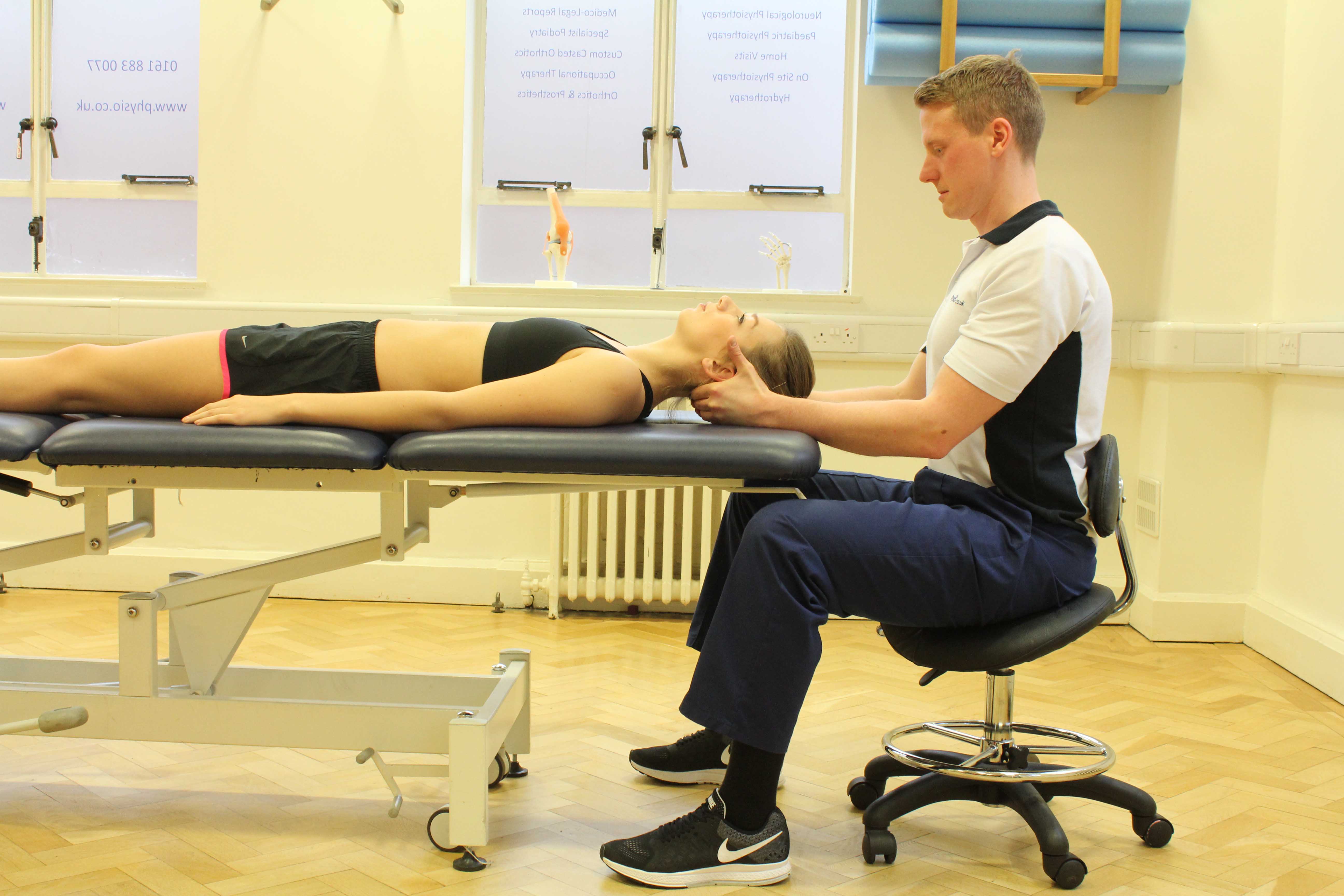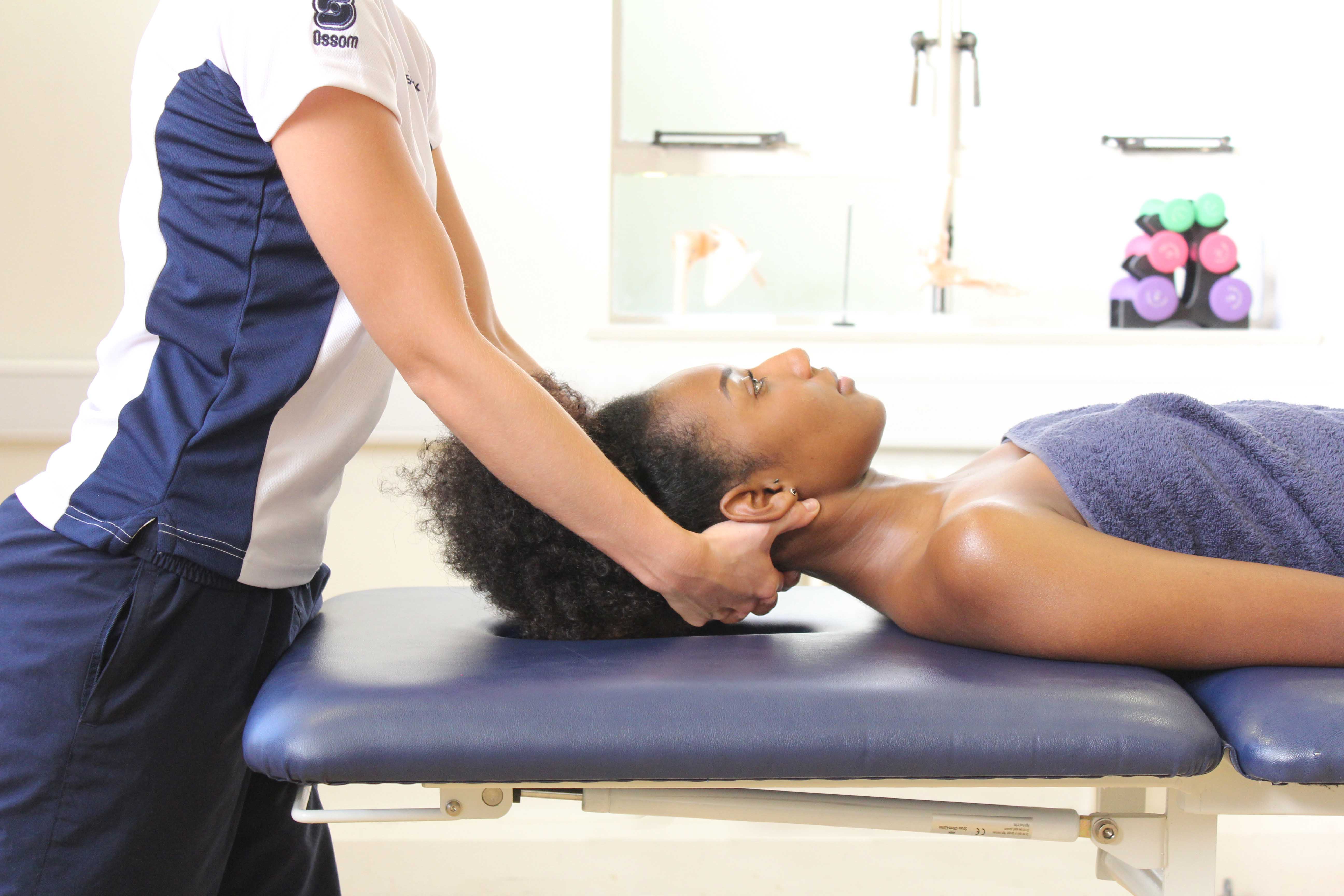What is trigeminal neuralgia?
Trigeminal neuralgia is a disruption of one the facial nerves that result in pain and discomfort around the affected area.
The trigeminal nerve is one of the main nerves of the face. The trigeminal nerve is located on both sides and splits into three primary nerves which further branch off to make smaller nerves. The first nerve supplies the forehead, eye area and the scalp. The second nerve supplies the cheek. The nerves from the third branch travel to the jaw area. The trigeminal nerve sends messages in response to sensation and pain, controls facial muscles and produces tears and saliva.
Trigeminal neuralgia is caused by a blood vessel pressing on the root of the nerve as it travels from the brain through the skull and becomes more common in individuals above fifty. The first attack of trigeminal neuralgia is sudden although further episodes come and go. Bouts of pain tend to become more frequent with age.
 Above: Soft tissue massage and mobilisations of the head, neck and jaw to relieve pain and stiffness
Above: Soft tissue massage and mobilisations of the head, neck and jaw to relieve pain and stiffnessCauses of trigeminal neuralgia
Trigeminal neuralgia is mainly caused by too much pressure being put one of the facial nerves: This disruption of the nerves may be a result of a number of factors including;
- Diabetes
- Certain medication
- Pressure on nerves by nearby structures (e.g. blood vessels or tumours)
- Swelling and irritation (inflammation)
- Trauma (including surgery)
Symptoms of trigeminal neuralgia
Trigeminal neuralgia is characterised by sudden and severe pains that originate from any one of the trigeminal nerves. Trigeminal nerve pain commonly begins at either the second or third trigeminal nerve. The frequency and severity of the pain may vary. Symptoms of trigeminal neuralgia include;
- Pain on one side of the face
- Cheek and jaw pain
- Sharp stabbing pain
- Pain that lasts up to 2 minutes
- Dull ache after an episode
- Tenderness after an episode
- Facial spasms
- Pain inside the mouth
- Tingling, numbness or burning around the affected area.
 Above: Soft tissue massage of the head and neck to relieve pain and tension
Above: Soft tissue massage of the head and neck to relieve pain and tensionWhat physiotherapy treatment will I receive for neuralgia / nerve pain?
If you are experiencing trigeminal neuralgia, physiotherapy can help reduce any pain you have as well as improve your ability to carry out everyday activities that have been affected by your condition. Physio.co.uk has specialist physiotherapists who will provide you with a thorough assessment and treatment plan. During your assessment your physiotherapist will ask a variety of questions and perform appropriate tests. Your physiotherapist will also attempt to reproduce the pain to indentify the precise cause of the trigeminal neuralgia. Your physiotherapist will then develop an appropriate treatment programme that will focus on your personal goals and needs.
For trigeminal neuralgia the main goals of your physiotherapy programme will be to relieve symptoms, restore function and reduce the pain in your face or other affected areas. Manchester includes a variety of activities and treatment methods that help you reach your goals. Your physiotherapy will include;
- Pain modalities for facial pain
- Acupuncture to relieve pressure and facial pain
- Heat orice (for pain relief)
- Stress management
- Relaxation techniques
- Cardiovascular exercise to improve overall health and fitness levels
- Education on how to make lifestyle changes that may affect your condition – advice on diet, managing sleep and managing rest
- Functional activities to help problems associated with daily living
Summary
Trigeminal neuralgia is pain that comes from the nerves of the face. Trigeminal neuralgia is a disruption of one the facial nerves which is commonly caused by a blood vessel pressing on the root of the nerve as it travels from the brain through the skull. Trigeminal neuralgia can also be caused by pressure as a result of inflammation. Trigeminal neuralgia causes symptoms such as sudden and severe pains around the face. The pain is often described as a sharp stabbing pain in the affected area that lasts up to two minutes. The frequency and severity of the pain may vary. Physiotherapy has shown to be a very effective method in the treatment of trigeminal neuralgia. Specialist physiotherapists at Physio.co.uk will focus on reducing pain, increasing mobility and improving everyday activities that may have been affected by trigeminal neuralgia. Call Physio.co.uk now on 0330 088 7800 for more information or to book an appointment please contact us. You can also book an appointment with us online today!

 0330 088 7800
0330 088 7800


































